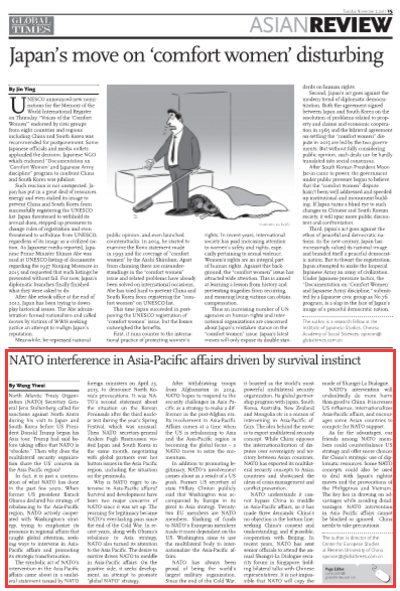Major Power Relations
Your Present Location: PROGRAMS> Major Power RelationsWang Yiwei: NATO interference in Asia-Pacific affairs driven by survival instinct
By Wang Yiwei Source: Global Times Published: 2017-11-6
North Atlantic Treaty Organization (NATO) Secretary General Jens Stoltenberg called for sanctions against North Korea during his visit to Japan and South Korea before US President Donald Trump began his Asia tour. Trump had said before taking office that NATO is "obsolete." Then why does the multilateral security organization share the US` concern in the Asia Pacific region?
In fact, it is just a continuation of what NATO has done in the past few years. When former US president Barack Obama declared his strategy of rebalancing to the Asia-Pacific region, NATO actively cooperated with Washington`s strategy, trying to emphasize its presence in regional affairs that caught global attention, seeking ways to intervene in Asia-Pacific affairs and promoting its strategic transformation.

The symbolic act of NATO`s intervention in the Asia-Pacific affairs came about in a unilateral statement issued by NATO foreign ministers on April 23, 2013, to denounce North Korea`s provocations. It was NATO`s second statement about the situation on the Korean Peninsula after the third nuclear test during the year`s Spring Festival, which was unusual. Then NATO secretary-general Anders Fogh Rasmussen visited Japan and South Korea in the same month, negotiating with global partners over hot button issues in the Asia Pacific region, including the situation on the peninsula.
Why is NATO eager to intervene in Asia-Pacific affairs? Survival and development have been two major concerns of NATO since it was set up. The yearning for legitimacy became NATO`s ever-lasting pain since the end of the Cold War. In recent years, along with Obama`s rebalance to Asia strategy, NATO also turned its attention to the Asia Pacific. The desire to survive drives NATO to meddle in Asia-Pacific affairs. On the positive side, it seeks development, an attempt to promote "global NATO" strategy.
After withdrawing troops from Afghanistan in 2014, NATO hopes to respond to the security challenges in Asia Pacific as a strategy to make a difference in the post-Afghan era. Its involvement in Asia-Pacific Affairs comes at a time when the US is rebalancing to Asia and the Asia-Pacific region is becoming the global focus - a NATO move to seize the momentum.
In addition to promoting legitimacy, NATO`s involvement comes about as a result of a US push. Former US secretary of state Hillary Clinton publicly said that Washington was accompanied by Europe in its pivot to Asia strategy. Twenty-two EU members are NATO members. Slashing of funds to NATO`s European members made it more dependent on the US. Washington aims to use the multilateral body to internationalize the Asia-Pacific affairs.
NATO has always been proud of being the world`s largest military organization. Since the end of the Cold War, it boasted as the world`s most powerful multilateral security organization. Its global partnership program with Japan, South Korea, Australia, New Zealand and Mongolia etc is a means of intervening in Asia-Pacific affairs. The idea behind the move is to export multilateral security concept. While China opposes the internationalization of disputes over sovereignty and territory between Asian countries, NATO has exported its multilateral security concepts to Asian countries and showcased the ideas of crisis management and conflict prevention.
NATO understands it cannot bypass China to meddle in Asia-Pacific affairs, so it has made three demands: China`s no objection is the bottom line; seeking China`s consent and understanding; and if possible, cooperation with Beijing. In recent years, NATO has sent senior officials to attend the annual Shangri-La Dialogue security forum in Singapore, holding bilateral talks with Chinese representatives. It is not impossible that NATO will copy the mode of Shangri-La Dialogue.
NATO`s intervention will undoubtedly do more harm than good to China. It increases US influence, internationalizes Asia-Pacific affairs, and encourages some Asian countries to compete for NATO support.
As for the advantages, our friends among NATO members could counterbalance US strategy and offer more choices for China`s strategic use of diplomatic resources. Some NATO concepts could also be used to deal with Japan`s rightist moves and the provocations of the Philippines and Vietnam. The key lies in drawing on advantages while avoiding disadvantages. NATO intervention in Asia Pacific affairs cannot be blocked or ignored. China needs to take precautions.
The author is a senior fellow with the Chongyang Institute for Financial Studies at Renmin University of China.
Key Words: NATO; North Korea; Trump; Wang Yiwei























































































 京公网安备 11010802037854号
京公网安备 11010802037854号





